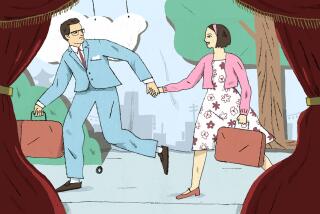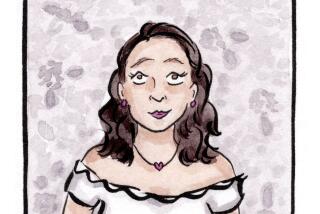Writer Gary Indiana on his new memoir, Susan Sontag and why he hates the ‘80s
At 65, writer, filmmaker, visual artist, actor and playwright Gary Indiana has had an unusual career, no matter what medium he was working in. Originally from Derry, N.H., Indiana landed in San Francisco in the summer of 1969. He briefly studied at UC Berkeley but dropped out to help a friend make pornographic films. After soaking up the sunshine noir and punk scene of 1970s Los Angeles, he moved to New York City and settled into a cheap East Village apartment — the same one he lives in today. Since 1987, Indiana has published novels, nonfiction, plays, short stories — all with an unmistakable, sardonic voice embedded in the text, and all experimenting with the traditions of form.
The title of his new memoir, “I Can Give You Anything but Love” (Rizzoli Ex Libris; $25.95), is “really about disconnection between sexual desire and love, in my life,” he says. A graphic and funny memoir, it finds Indiana reinventing yet another genre — this time using his own personal narrative. He becomes the connective tissue that binds together a diaspora of subcultures: the beatnik-era experimental writing and happenings of downtown New York, the 1960s co-opted counterculture gone awry, the punk movement that followed, and the art and intellectual circles of the Reagan ‘80s, when the AIDs crisis was wiping out a generation of young gay men like him.
Indiana unleashes his frustrations with Susan Sontag (“Susan thought other people were stupid — her friends were only tolerably less stupid than the general run of humanity”) and writes affectionately about Cuba, where he’s been living and writing on and off for the last 20 years.
He spoke by phone as he was getting ready to return to Los Angeles for an exhibition of his visual art at the 356 Mission Gallery, on view through Nov. 15.
I don’t know if you would classify your new book as an anti-memoir, but that’s certainly how it reads.
It’s sort of structured to thwart people’s expectations.... I found it almost consistently painful to do because I just kept thinking, “I don’t really care to reveal this much about my life.” If people can pin something on you they think they know everything about you. I’m a homosexual. “Oh, he’s gay,” or stuff like that. I really spent my whole career trying to elude those kinds of easy classifications of what I do because being gay is not my subject. I’m interested in the world.
Your novels are already so autobiographical. So was this memoir a different conceit in that it would be explicitly about you in real life, as opposed to writing what you know as literature?
My novels are not in any way documentaries of my life, but I’ve used a lot of things that happened to me in those books, and what happened to the people around me.
Also, this is a kind of latter-day consideration: There has been so much necrophile sentimentality of the ‘80s, as if they were this wonderful period. They really weren’t. In the ‘80s — everybody died. I don’t know how many people I know died in the prime of their lives, and I don’t want to revisit that in any way whatsoever. Also, I know everything that’s happened to New York City, or most of the things that have happened to New York City, are lamentable and horrifying if you have any class-consciousness or any social conscience. I truly don’t miss the old days. I’m interested in my life now and what happens in my life now. I’m not enamored of the past as my image of perfection.
How did you stumble into other mediums, like photography, playwriting, visual art, actor?
I think everything for me is a form of writing. It’s a form of tracking my own consciousness and my own experience of the world in some way, registering it in some way. Sometimes you can’t write, sometimes you don’t want to write. Sometimes language is too imperfect somehow. Sometimes language doesn’t convey what you want to convey. Doing photography, video or film or anything like that I always feel like I’m writing. I’m somebody who is very preoccupied with form. Anybody that really reads my novels will understand this, because no two are remotely alike formally. I try to do as big a spread as possible in terms of the formal experiments.
In this new book, your ruminations on the past, including your estranged relationship with a writer friend like Susan Sontag feel cathartic. How do you see it?
For at least eight years, I had daily contact with Susan Sontag. Either we saw each other, went out, talked on the phone, whatever, so I have every right to describe what I feel about Susan, what I thought about Susan. Maybe what’s in the book is harsh, but Susan was a very harsh person, and she was a very difficult person to be a friend to and after a while one realized that it was impossible to be a friend to Susan and not be a hypocrite.
Gabel is a writer, editor and small publisher in Los Angeles.
More to Read
Sign up for our Book Club newsletter
Get the latest news, events and more from the Los Angeles Times Book Club, and help us get L.A. reading and talking.
You may occasionally receive promotional content from the Los Angeles Times.






